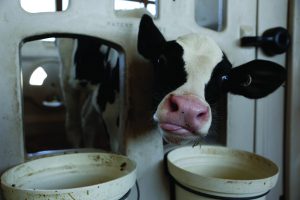R.F.D. NEWS & VIEWS: Dairy producers eligible for grants
By Tim Alexander for Chronicle Media — March 11, 2021
Illinois dairy producers are currently eligible to apply for Dairy Business Innovation Alliance grants of up to $50,000, according to the Illinois Milk Producers Association. (IMPA/Mitchell Dairy photo)
New this week: Illinois counties led the nation in 2020 corn and soybean output, according to the USDA. In addition, Midwest milk producers are eligible for extended pandemic relief, and the FSA is struggling to accommodate in-person visits by farmers who need to declare crop insurance and other key decisions before March 15. For this and more, please read on …
Illinois counties lead U.S. corn, soybean production
SPRINGFIELD — McLean County has returned to its familiar top spot in the U.S. for corn production along with soybeans, according to 2020 production data from the USDA. Estimates show McLean led the nation with 62.85 million corn bushels and 19.25 million soybean bushels, while other Illinois counties appeared near the top of the list for total production and yield.
“It’s not the first time McLean County jumped to the top of the whole country and they’ve done it again,” said Mark Schleusener, Illinois state statistician for the USDA National Agricultural Statistics Service. “That central and eastern part of Illinois has big counties and there were some really good yields this past year.”
Iroquois County farmers brought in the second-most bushels of corn, at 59.84 million, and third-most bushels of soybeans, at 17.08 million, in the nation. In addition, Champaign County produced the fourth-most soybeans in the U.S., at 16.57 million bushels.
As for average corn yield, the top five county corn yields in Illinois were Menard (216.3 bu./acre), Peoria (214.7), Stark (212.4), Piatt (211.7) and Warren (211.1). Piatt County led Illinois in soybean yield (70.5 bu/acre), followed by Logan and Sangamon (67.6), Carroll (67) and Menard and Macoupin (66.2). (Illinois Farm Bureau news/USDA)
USDA addressing office staff shortages
WASHINGTON, D.C. — Farmers are known for doing business that is sealed with a handshake. But with a March 15 deadline for crop insurance and other decisions looming, many farmers are reportedly feeling shut out by their local Farm Service Agency offices. This is because of the USDA’s Covid Workplace Safety Plan, which encourages teleworking and a reduction of in-person employees to 25 percent of the pre-pandemic workforce.
FSA and other agencies operating under the USDA Farm Production and Conservation umbrella met with the office of U.S. Agriculture Secretary Tom Vilsack last week to discuss possible adjustments to the Covid safety plan, reported Jim Wiesemeyer of ProFarmer. According to his sources, guidance from FPAC indicates they are working to provide exemptions for service centers that are “in areas of low community transmission.” However, while program delivery staff will continue to come into the office, “they will be working with our producers by phone, and using online tools whenever possible.”
Many Midwest FSA offices are listed as being open only for phone appointments, while a few are identified as offering limited in-person appointments. FSA is reportedly pushing for deadline extensions, which would be announced this week. The current conditions “will almost certainly, seriously and unnecessarily delay and complicate COVID relief to producers,” according to one ProFarmer farm policy analyst.
B100 proves winter-ready for ADM fleet
BLOOMINGTON — ADM’s use of B100 in a fleet of trucks during the recent cold snap illustrates how well biodiesel can operate in cold winter weather, the Illinois Soybean Association noted last week. According to the ISA, high biodiesel blends can be successfully used year-round, even in the coldest U.S. climates. The common misconception of biodiesel is that cold weather limits performance, but recent temperatures as low as minus 10 degrees F were no trouble for the ADM trucks, which traveled more than 23,500 trouble-free miles on sustainable B100 biodiesel in February.
The ADM fleet is part of a cooperative pilot program to demonstrate the real-world viability of Optimus Technologies’ Vector System, which is designed to allow conventional diesel engines to run on 100 percent biodiesel in a wide range of climates. “This pilot, using ADM trucks and ADM-produced biodiesel, has the potential to validate technology that could dramatically increase the use of environmentally friendly biodiesel across the trucking industry,” said Steve Finn, ADM vice president for trucking. “We’re excited to be part of this project, and we’re proud to see the technology proving itself.”
Biodiesel blends up to B20 should be treated just like petroleum diesel fuel by using cold-weather additives recommended by your fuel supplier, according to the ISA, while B100 should be paired with technology such as The Vector System when operating in colder climates. (ISA news)
Dairy producers eligible for grants
BLOOMINGTON — The Dairy Business Innovation Alliance is offering Illinois, Iowa, Minnesota, South Dakota and Wisconsin producers an opportunity to apply for cash grants to augment farm diversification, creation of value-added dairy products and starting or increasing exports of dairy products. Grants of up to $50,000 will be awarded to producers through a competitive process as part of DBIA’s current $1 million grant cycle, the partnership announced on March 1.
Interested dairy farmers should first view a webinar series (www.cdr.wisc.edu/dbia-webinars) before applying for a grant. Applicants who need assistance in developing a project proposal or budget sheets — which are required — are encouraged to contact their local Small Business Development Center. DBIA provided $230,000 to 13 dairy farms and businesses in the five participating states last year, according to a news release from the Illinois Milk Producers Association.
To help potential applicants get a better understanding of the reimbursement grant program used by the DBIA hosted a webinar on March 9. Visit www.cdr.wisc.edu/grant-webinar-spring-2021 to view the webinar.
Illinois Farm Fact:
The Illinois Soybean Association’s current checkoff investment in production research is $1.4 million. Their successes include making way for soybean-wheat double-crop acreage expansion in Illinois counties covered by crop insurance. (Illinois Soybean Association)






